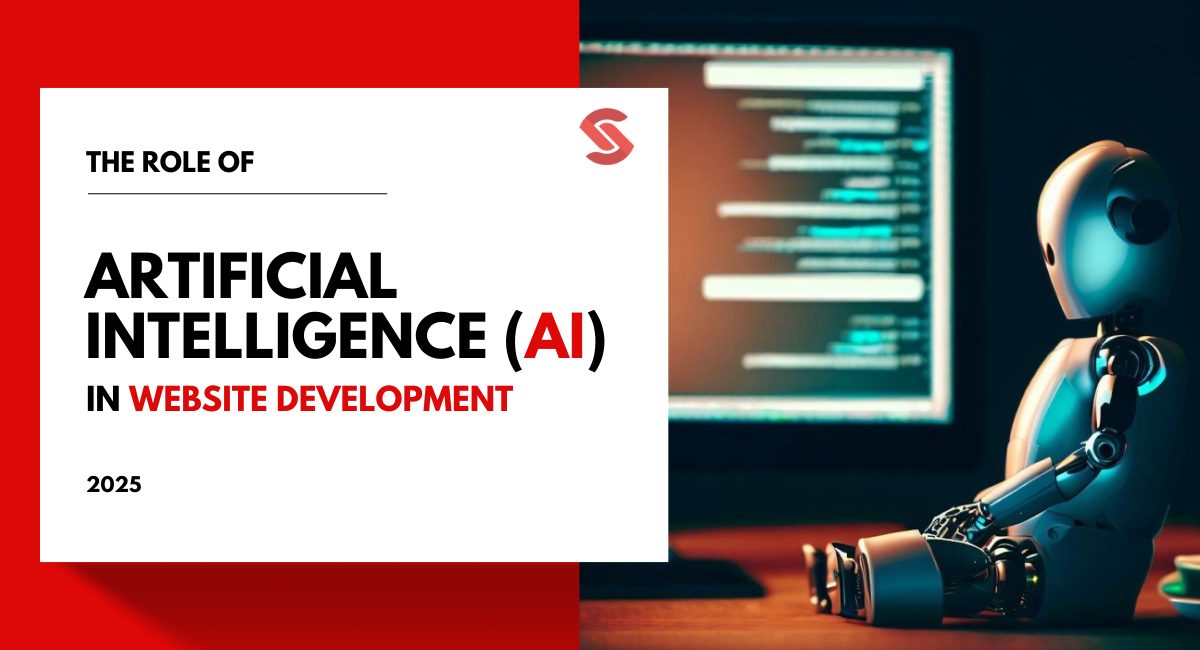We all have seen movies in which AI is portrayed as being dominated by brilliant robots or machines. However, AI is nothing to be afraid of. Instead, it increases innovation and reshapes industries across all sectors.
AI is improving the efficiency and intelligence of processes in industries like healthcare and finance. Website development through Artificial intelligence is no different.
Artificial intelligence is improving website designs, development, and optimization by making the process quicker, more effective, and easier to use. We’ll talk about how main role of Artificial intelligence in website development in this blog and why it matters to you.
The Evolution of AI in Website Development
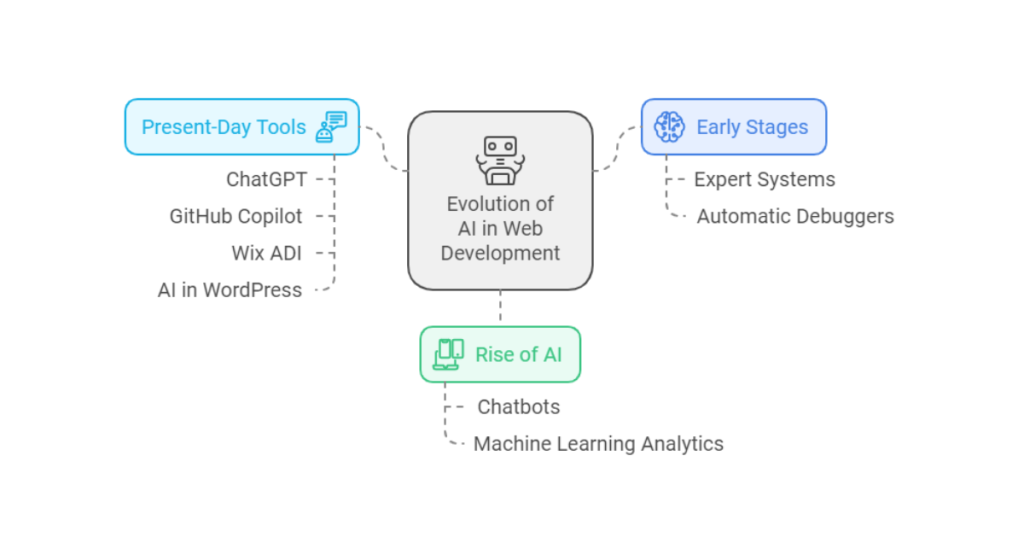
The development of websites has experienced a major shift, from human coding to clever, automated solutions.
AI-driven technologies can now optimize design, analyze user behavior, and even build code when in the past developers had to do everything by hand.
This invention is changing the way websites are created and viewed by making web development easy, more effective, and more customized.
Early Stages of AI in Technology
The history of AI in technology began with simple systems such as early expert systems and automatic debuggers.
These early advancements set the foundations for later AI-driven web development tools by directing attention to AI’s potential to increase productivity and automate coding jobs.
The Rise of AI in Web Development
AI started to impact web development as webpages got more dynamic and customized.
Tools such as chatbots and machine learning-driven analytics assisted developers in creating more engaging and optimized websites.
AI began to simplify processes, enabling developers to create websites more quickly, intelligently, and with a focus on users.
Present-Day AI Tools for Web Development
AI tools are changing web development today by increasing creativity, productivity, and accessibility for both developers and non-developers.
These solutions may handle anything from content production to code help using automation and machine learning, which cuts down on the time and effort needed for conventional development jobs.
- ChatGPT: Assists with content generation and coding.
- GitHub: Copilot Predicts and suggests code to speed up development.
- Wix ADI: Automates website design for non-developers.
- AI in WordPress: Automates tasks like SEO, content personalization, and more.
These tools make development faster, reduce manual effort, and provide more personalized, high-performing websites. These technologies reduce boring processes, enabling developers to work more productively and concentrate on more complex design and functionality elements.
How AI is Shaping the Website Design Process
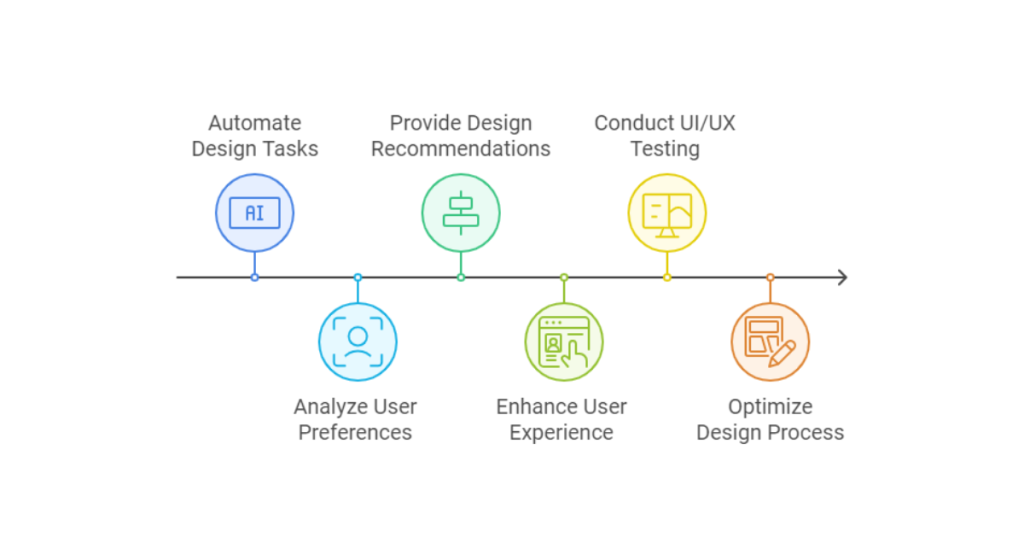
AI is changing website design by automating critical activities such as layout choices and color palettes. These tools provide insightful recommendations by analyzing design trends and user behavior.
AI speeds up and optimizes the process by managing the technical aspects, letting up designers concentrate on their creative work and producing more user-friendly, aesthetically pleasing websites with less work.
AI-Driven Design Automation
AI is greatly reducing the process of designing websites by automating time-consuming operations. Artificial intelligence (AI) tools can examine user preferences and design patterns to offer recommendations that quicken development without sacrificing consistency or quality.
- AI automates processes like as layout design, color matching, and font choosing.
- AI reduces human mistakes and helps guarantee consistency across design aspects by automating these repetitive operations.
- Real-time design recommendations are provided by tools like as Adobe Sensei and Figma AI, which are based on user trends and behavior.
Enhancing User Experience (UX) with AI
AI is improving websites’ ability to provide individualized experiences. AI assists in delivering content, recommendations, and layouts that are specifically matched to the preferences of users by evaluating data such as browsing behaviors, user preferences, and historical activity.
This increases user engagement by making the website more user-friendly and relevant to their needs. AI also tracks user behavior on the website, identifying problematic areas and modifying the layout to improve usability.
AI in UI/UX Testing
Testing multiple design possibilities has gotten easier because of automation. Systems can quickly evaluate multiple versions of a design, monitor user interaction, and determine which one performs best without the need to manually set up A/B testing.
These technologies also monitor user activity to identify patterns that may not be immediately apparent, resulting in a greater understanding of how people use the website.
Designers can improve the entire user experience by using these findings. Testing speeds up by this automated procedure, which also improves its accuracy and efficiency.
Artificial Intelligence for Backend Web Development
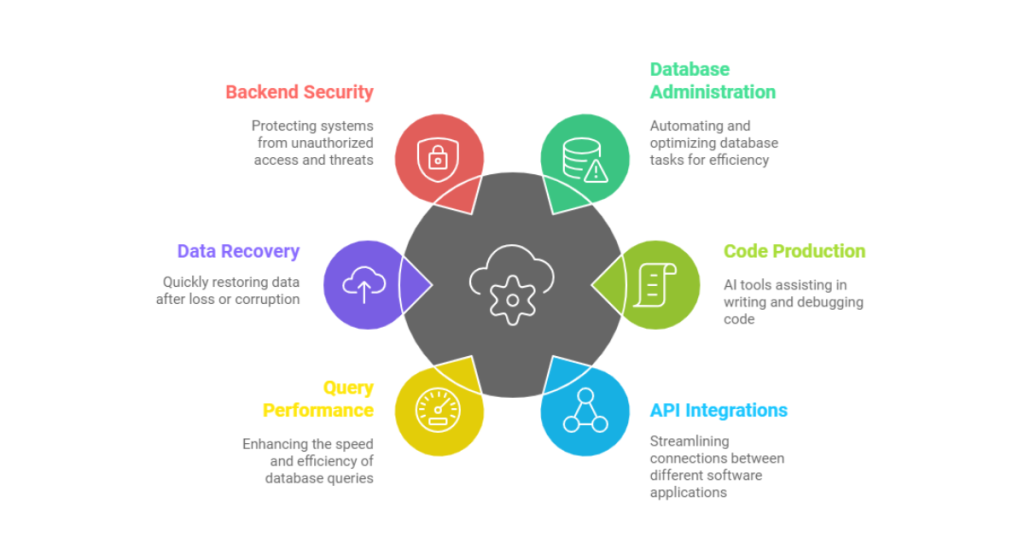
AI is making backend operations easier by automating database administration and code production.
It optimizes API integrations, enhances query performance, and expedites data recovery.
AI tools improve backend security, increasing the dependability and security of systems.
AI is also beneficial in server load prediction, reducing crashes and enhancing scalability as traffic increases. It also swiftly finds and fixes mistakes, resolving problems before they affect performance.
AI-Powered Coding Assistants
AI-powered coding assistants are transforming the way developers write and debug code, making the process faster and more efficient. These tools help developers by suggesting code snippets, detecting potential bugs, and offering real-time feedback, enabling smoother and more accurate coding.
- Code generation and real-time debugging.
- AI helps identify and fix common coding errors.
- Tools like GitHub Copilot and Tabnine assist with intelligent code suggestions.
Enhancing Web Performance Using AI
AI keeps everything functioning properly, which enhances the performance of your website. It keeps an eye on server activity in real-time, identifying problems before they cause your website to lag. Even during peak hours, this results in quicker load speeds and fewer waits for your guests.
AI also modifies resources as necessary, guaranteeing that your website can seamlessly manage traffic increases. As your audience grows, it makes it easier for your website to scale while maintaining consistent and dependable performance.
AI in Database Management
Artificial Intelligence improves database administration through query optimization and the automation of tedious processes such as finding data and indexing.
It improves database performance by identifying the most effective methods for organizing and storing data, which speeds up the data access process.
AI-driven indexing improves system efficiency and response times by further simplifying database operations.
AI in Website Security
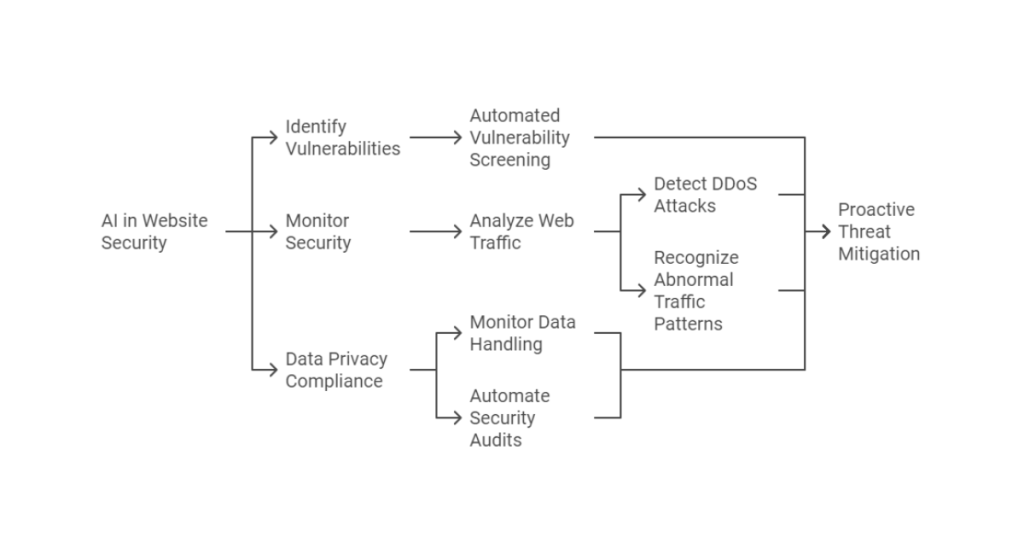
AI isn’t just great for website development but is a powerful tool for enhancing website security. Systems with AI capabilities can proactively identify and address security risks, spotting vulnerabilities before they can be exploited.
Automated vulnerability screening and security monitoring ensure that your website is always secure.
AI continuously strengthens its defenses against potential threats by acting quickly to reduce harm and ensuring a quicker recovery in the event of a breach.
AI in Cybersecurity for Websites
AI helps increase website security by identifying weaknesses and thwarting online attacks. It can identify vulnerabilities, such as configuration problems or defects in the code, and notify developers so they can quickly address them.
Moreover, artificial intelligence excels at identifying and thwarting dangers instantly. Large volumes of data can be analyzed by it to identify questionable activities, such as malware or illegal access, and take action before the threat gets out of hand.
AI-Based Web Traffic Analysis for Security
The way we track and examine online traffic for security has been changed by AI. It can instantly sift through vast volumes of data to identify threats and stop attacks.
- Detecting and preventing DDoS attacks: AI can analyze traffic data in real time, identifying DDoS attack patterns and blocking malicious requests before they impact website performance.
- Recognizing abnormal traffic patterns: AI-powered algorithms detect anomalies in web traffic that could indicate cyber threats, such as botnets or credential-stuffing attacks.
Using AI in traffic monitoring helps organizations protect their websites from cyber threats. The ability of artificial intelligence to identify unusual trends enables early detection, which makes it necessary to prevent attacks before they inflict major damage.
AI in Data Privacy Compliance
AI has been assisting firms in meeting data privacy rules such as GDPR and CCPA by automating many operations that would otherwise be difficult to manage manually.
It keeps an eye on how data is handled, shared, and stored to make sure privacy regulations are being observed.
AI, for example, can quickly identify spot cases of handling of sensitive data, avoiding more serious compliance problems.
AI also automates security audits and legal checks, allowing companies to spot problems early and reduce the risk of fines or legal trouble.
AI for Web Development Process Improvement
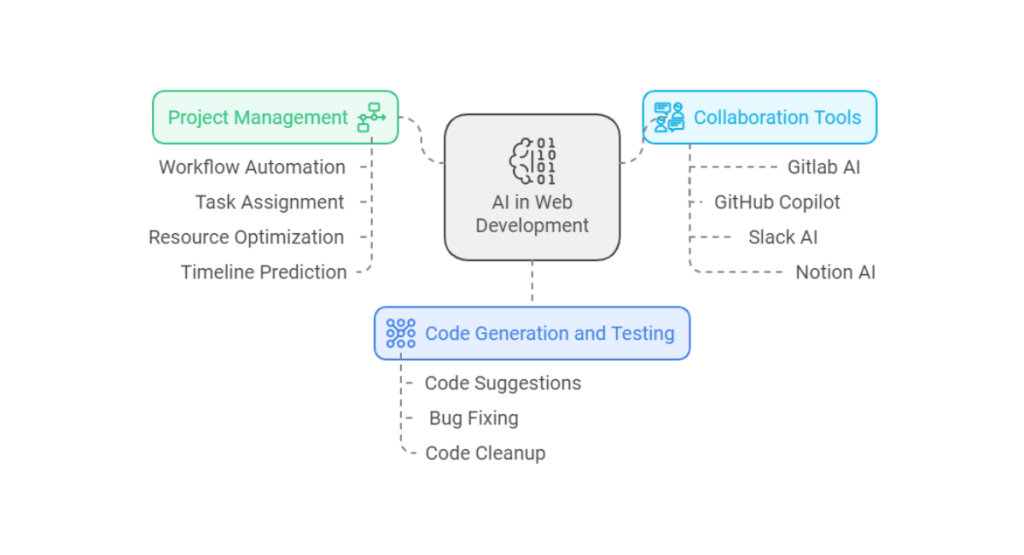
AI-powered website performance optimization improves everything from content distribution to page load times. Faster load times are guaranteed by AI-powered page speed optimization, which effectively analyzes and controls traffic.
The user experience is further improved by dynamic content delivery, which automatically modifies material in response to demand.
On top of that, AI-driven file and image compression lowers the usage of bandwidth without sacrificing quality, and real-time performance analytics offer ongoing insights and optimizations to maintain the functionality of your website.
Automating Code Generation and Testing
AI tools are changing how we write and test code, making the whole process faster and more reliable. These tools can suggest code as we type, spot potential problems early, and even help clean up messy code.
They also make testing easier by automatically checking if everything works correctly and helping fix bugs quickly. Think of it as having a knowledgeable coding buddy who works alongside you.
Streamlining Project Management with AI
AI is transforming project management from guesswork into a more precise science. It helps teams plan better by analyzing past project data to predict timelines, automatically assigning tasks to the right people, and suggesting the best use of team resources.
Common AI-powered project management tools:
- Monday.com: Uses AI to automate workflows and suggest task priorities
- Asana Intelligence: Helps predict project timelines and potential bottlenecks
- ClickUp AI: Assists with resource planning and automated task assignment
- Wrike’s Work Intelligence: Provides smart project analytics and forecasting
- Microsoft Project + AI: Offers predictive project scheduling and resource optimization
It’s true that AI tools are helpful, but they work best when combined with human judgment and experience.
Enhancing Collaboration Through AI
AI is making it easier for development teams to work together, even when they’re spread across different locations. It helps by managing code changes smoothly, suggesting solutions when team members’ code conflicts, and keeping everyone in sync. Think of it as having a smart coordinator who helps prevent confusion and keeps work flowing smoothly between team members.
Here are the popular AI collaboration tools:
- GitLab AI: Helps spot and resolve code conflicts, suggests code improvements
- GitHub Copilot: Assists with code review and pair programming
- Linear: Smart task tracking and team coordination
- Notion AI: Makes team documentation and knowledge sharing easier
- Slack AI: Helps summarize discussions and highlight important decisions
AI Content Management for Websites
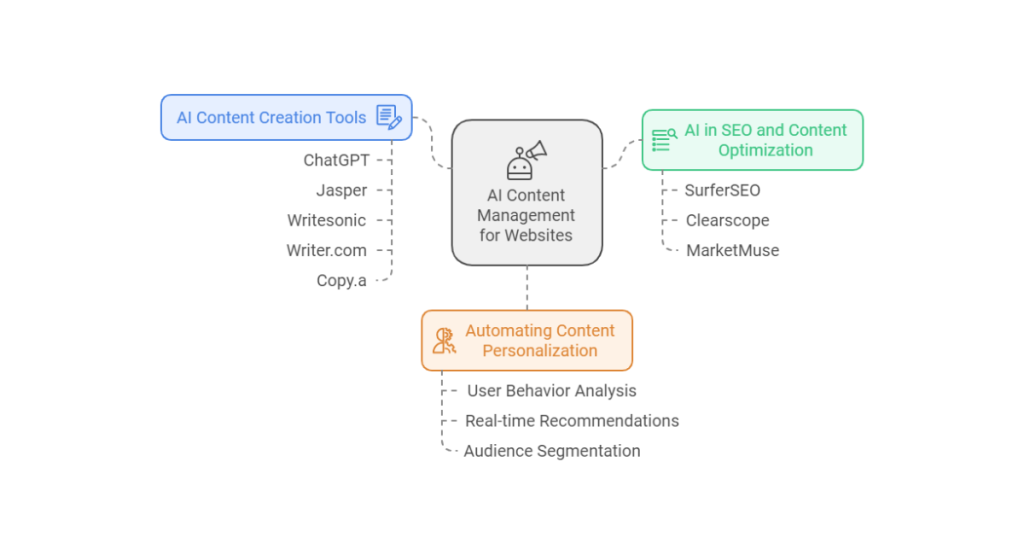
Artificial Intelligence is making websites smarter in how they manage and show content to visitors. Working with is like having a helpful chauffeur, who knows what your website visitors like to read and helps organize everything neatly.
When someone visits your website, this assistant makes sure they see content they will probably enjoy, just like a good librarian who knows which books you might like.
The system helps keep your website organized by sorting content into the right categories and picking good times to show new articles or posts. The best part is that it learns and gets better over time by watching what works well with visitors.
AI Content Creation Tools
AI writing tools help create content faster and more consistently. These systems can draft blog posts, product descriptions, and articles while maintaining your brand’s voice. According to Semrush’s State of Content Marketing 2024 Report, 47% of content teams now use AI tools in their workflow, resulting in a 34% average increase in content production speed.
Common AI writing tools:
- ChatGPT: Helps with brainstorming and drafting various types of content
- Jasper: Specializes in marketing content and brand-specific writing
- Writesonic: Useful for creating blog posts and product descriptions
- Writer.com: Helps maintain consistent brand voice across all content
- Copy.a: Good for creating short-form content like ads and social media posts
While they speed up the writing process, they still need human oversight to ensure quality and accuracy.
AI in SEO and Content Optimization
AI is transforming SEO by helping optimize content and improve search rankings. AI tools analyze keywords, optimize meta tags, and enhance content structure, making it easier to rank higher in search engines.
- SurferSEO: Analyzes top-ranking pages and offers detailed suggestions on content structure, keyword use, and SEO elements to boost rankings.
- Clearscope: Focuses on content relevance, providing AI-driven keyword suggestions and optimization tips to align with search intent.
- MarketMuse: Enhances content by analyzing existing articles and offering suggestions for improvement to ensure high-quality, SEO-friendly content.
These tools also suggest better headers and improve on-page SEO for better visibility. These AI-powered tools help make SEO more efficient, ensuring your content is optimized for better search performance.
Automating Content Personalization
Did you know that personalized content can increase user engagement by up to 80%? AI-powered systems are leading the way by analyzing user behavior to deliver tailored recommendations.
These tools track user interactions in real-time, providing relevant articles, videos, or products based on individual preferences.
By automatically segmenting audiences, AI helps ensure that each user receives a customized experience, keeping them more engaged and satisfied.
This personalized approach makes content more meaningful and improves the overall user experience.
Challenges & Limitations of Implementing AI in Website Development
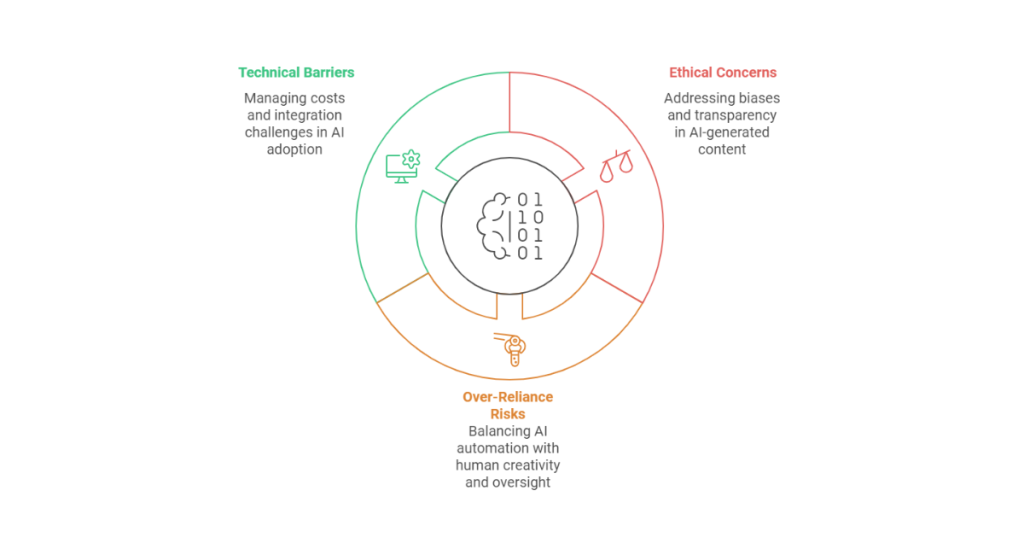
Everything has its pros and cons, and AI in website development is no different. While AI brings automation and efficiency, it also presents challenges. Ethical concerns, like bias and fairness in AI decisions, are major hurdles.
There’s also a risk of over-reliance on AI, which could reduce human oversight and control. Implementing AI is resource-intensive, requiring significant investment and technical expertise.
Transparency and accountability are key to addressing long-term risks and ensuring a balanced integration of AI with human input.
Ethical Concerns with AI-Generated Content
Creating content with AI may be quick, but it raises ethical concerns. AI-generated content can carry biases based on the data it’s trained on, leading to unfair or biased outcomes.
A lack of transparency in AI algorithms makes it hard to understand how decisions are made, further complicating the issue.
To ensure fairness, developers must address algorithmic biases and improve AI transparency.
As Mark Zuckerberg noted, “AI systems need to be understandable to ensure trust and accountability.”
Strategies like ethical reviews and clear accountability can help manage these concerns and ensure responsible AI use.
Dependency on AI for Core Development Tasks
While AI is transforming website development by automating many tasks, over-relying on it poses risks. Artificial intelligence lacks human creativity and refined decision-making, and overreliance on it might result in mistakes or lost chances for innovation. Human oversight must be maintained, and AI effectiveness must be balanced with human knowledge.
Here are some cons of depending too much on AI for core development:
- Reduced human oversight can lead to errors or bias.
- AI lacks the creativity and problem-solving ability humans provide.
- Over-automation may result in rigid systems with limited flexibility.
- Key decisions may be based solely on data, missing the human touch.
Technical Barriers to AI Implementation
AI offers exciting possibilities in website development, but it also introduces several technical challenges. High resource requirements, including substantial computing power and data, make AI implementation expensive.
Compatibility problems might also make it challenging to integrate AI with legacy, older systems. Since AI algorithms are frequently complicated, only highly qualified individuals can properly manage and implement them.
The cost of implementation is another issue for many businesses. Gradual integration of AI and upskilling development teams can help mitigate these challenges, ensuring a smoother adoption process while managing resources more effectively.
The Future of AI in Website Development
We can’t predict the future with certainty, but AI will play a major role in shaping website development. AI-driven web design will evolve, enabling more customized and interactive websites.
It will likely integrate with emerging technologies like augmented reality (AR), virtual reality (VR), and the Internet of Things (IoT), transforming user experiences.
Predictive AI will assist developers by anticipating user needs, while AI-augmented tools will streamline the development process, making web design more efficient and personalized in the future.
AI Trends Shaping the Future of Web Development
The future of web development is being shaped by groundbreaking advancements in artificial intelligence, which is expected to greatly enhance the way websites are designed and experienced.
Predictive AI will revolutionize design choices by analyzing user behavior and trends, enabling developers to create more intuitive and personalized interfaces.
It will also make it easier to integrate immersive technologies like the Internet of Things (IoT), virtual reality (VR), and augmented reality (AR), which will result in more intelligent and interactive websites.
Preparing for an AI-Driven Web Development Future
As web development increasingly integrates AI, developers, and businesses must evolve to drive growth. Learning AI-driven tools, automation techniques, and preparing for AI-powered development environments is important.
Developers should focus on upskilling in machine learning, AI-based design, and automation tools. Teams should adapt workflows and embrace continuous learning to manage AI’s integration into web development.
But what I’ll be getting?
- Increased efficiency with automation.
- Staying competitive in rapidly evolving technologies.
- Improved website functionality and user experience through AI.
- Better collaboration with AI-enhanced tools for faster development.
Conclusion
AI is changing how websites are built by making them smarter, faster, and more personalized. It simplifies design, boosts security, and improves the user experience, giving businesses a smart way to grow.
But AI won’t give you a more personalized experience. We offer custom website development services to meet your brand’s digital needs. Our websites load faster, engage users better, and keep your data safe. Don’t settle for a basic site; choose Softnix for a more powerful, personalized website that helps your business grow.
FAQs
How does AI improve website development?
AI enhances website development by automating repetitive tasks like code generation, testing, and content creation. It also provides personalized user experiences by analyzing behavior patterns and optimizes SEO elements like keywords and meta tags to improve search rankings.
What are the main benefits of AI-powered website development?
AI-powered development increases efficiency, reduces errors, and offers real-time user personalization. It automates tasks, improves website functionality, and boosts SEO performance. Additionally, AI helps in predictive analysis and integration with other technologies like AR, VR, and IoT.
Are there risks in relying too much on AI for web development?
Yes, over-relying on AI can reduce human oversight, leading to potential errors or biases in decision-making. It may also stifle creativity and create dependency on automated processes. Balancing AI with human input is essential to ensure quality and innovation.
What ethical concerns are associated with AI-generated content?
AI-generated content can sometimes be biased due to the data it’s trained on. Lack of transparency in AI algorithms can lead to unfair or unethical outcomes, making it crucial to address algorithmic biases and ensure accountability in AI-driven content.
Can AI fully replace human developers in the future?
While AI can automate many tasks, it cannot fully replace human developers. Human creativity, critical thinking, and decision-making remain essential in developing complex projects. AI is a tool to assist, not replace, human developers in creating efficient, innovative websites.
How does AI help with SEO and content optimization?
AI enhances SEO by analyzing keyword trends, optimizing meta tags, and suggesting content improvements. It provides insights into user behavior, helping businesses create targeted, relevant content that improves search rankings and enhances the overall user experience.
What skills are needed for developers to work with AI-powered tools?
Developers need to upskill in machine learning, automation, and AI tools. Understanding data analysis, predictive algorithms, and AI-driven design is essential for working effectively with AI-powered platforms and tools in web development.
How can businesses prepare for AI-driven web development?
Businesses should invest in upskilling their teams, adopt AI tools gradually, and integrate AI with existing workflows. Providing AI training, combining human expertise with AI automation, and staying updated on emerging technologies like AR, VR, and IoT are key strategies for preparing.
What are the challenges of integrating AI into existing websites?
AI integration can be resource-intensive and may require significant technical expertise. Challenges include compatibility with legacy systems, the complexity of AI algorithms, and the high cost of implementation. Gradual integration and continuous upskilling can help overcome these hurdles.
What role will AI play in the future of web development?
AI will continue to shape the future of web development by automating more tasks, enhancing user personalization, and integrating with emerging technologies like AR, VR, and IoT. Predictive AI will assist developers in creating intuitive, efficient websites tailored to user behavior and needs.

